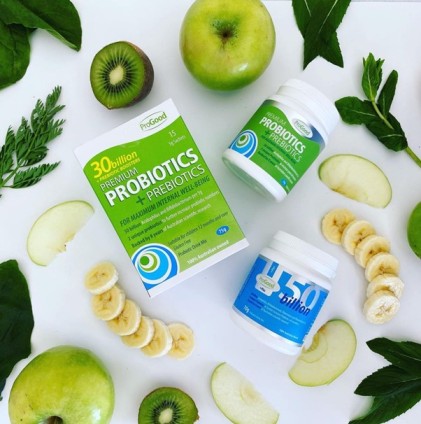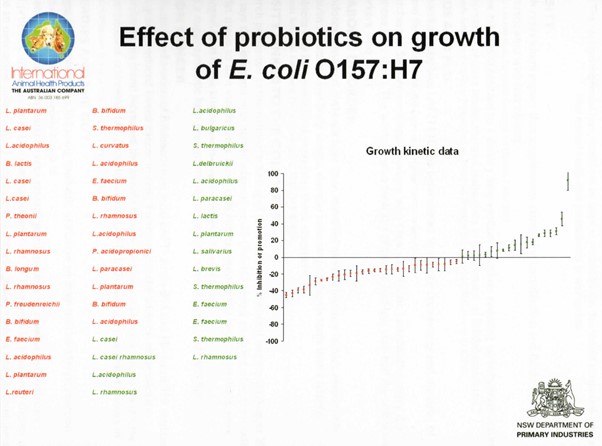ProGood Probiotics, interview with John Ellerman
Thanks for joining me today on my journey to find the best probiotic supplements in the market! In this blog series, I will be having a deep look at the science behind a probiotic supplement of choice. Whenever possible, I will also interview someone from the company so that I am able to get all responses to my "sciency" questions.
As a first guest for this series, I have interviewed John Ellerman about his Australian product, ProGood Probiotic. We discussed some general terms about probiotic supplementation and the reason why you can't trust all probiotics brands out there. John Ellerman also shared a very interesting experiment comparing Australian probiotics. Finally, we dived into the two bacterial strains of ProGood and the reasons that make this supplement of high quality.
Hope you enjoy the read and find it informative so that you can make your own choice when it comes to probiotic supplements.
I am not sponsored by ProGood Probiotics.
Meet John Ellerman, The Creator Of ProGood Probiotics
John Ellerman (BSc, MASM, Consultant Microbiologist) is the owner of ProGood Probiotics, a family-owned Australian business, with over 40 years of experience in microbiology. His product is based on over 8 years of research at the Cooperative Research center (CRC) for Food Industry Innovation in collaboration with researchers from the University of NSW & the CSIRO.
What Is A Probiotic Supplement?
A probiotic supplement is made of good live bacteria and/or yeasts that naturally live in our body and that confer health benefits to us. For instance, probiotics can protect us from not only gut infections, but also diseases like the common cold; help prevent and treat gut-related conditions such as diarrhea, constipation, bloating, and cramping; improve mental disorders like depression, anxiety, and stress; reduce “bad” LDL cholesterol levels; boost the immune system; and finally, some studies have shown their potential in certain allergies and eczema.
Should You Use Probiotic Supplements?
Probiotic supplements can help especially if you have a gut condition such as diarrhea, constipation, infections, but also anxiety or depression. The good probiotic bacteria will fight and limit the bad bacteria by directly acting on them or by strengthening the immune system and intestinal epithelial cells. If you do not take them, your body will recover but it may take longer or, in some cases, when the gut microbiota does not improve naturally, these conditions can remain chronic.
Probiotics are a very useful tool to stabilize the gut microbiome when taking a course of antibiotics. Some people develop diarrhea after using antibiotics and can also become colonized by pathogenic bacteria, such as Clostridium difficile.
What about healthy people? Whenever research has proven their health benefits, probiotics are considered safe to take daily as a way to prevent gut-related conditions.
What About Fermented Foods For Gut Health?
Fermented foods have been around the world as part of healthy diets and used for food preservation. Think of kimchi in Korea, natto in Japan, miso in Japan and Korea, and tempeh in Indonesia, just to mention a few.
Taken in moderation, these foods can be perfectly healthy and are an easy way to introduce bacteria to your gut. However, these foods contain many different bacterial species, and most of them have not been researched. We do not know yet whether these bacteria are good, bad or neutral. The most likely scenario is that there will be a mix of all of those. Moreover, some foods in the market are pasteurized, a process that kills the bacteria and negates most of the potential health effects.
On the other hand, probiotic supplements chose their bacterial strains for their health-promoting properties and are introduced in huge amounts per dose. It is very important to highlight that not all probiotics in the market have research behind them. Moreover, many manufacturers boost the numbers of bacteria in their products by adding cultures such as yoghurt starters (Streptococcus thermophilus and Lactobacillus bulgaricus), which may not necessarily have good health-promoting qualities. This way they increase the variety of bacterial species in their product so that they can claim a higher quality product and increase their price.

ProGood Strains
Probiotic supplements will generally contain species of bacteria already found in common foods because they are known and accepted to be safe and non-toxic. For example, dairy products contain Lactobacillus and Bifidobacterium species and, as a result, many probiotics do too.
ProGood Probiotics contains very high levels of strains that have been chosen based on their probiotic potential showed in previous research.
Lactobacillus acidophilus LAFTI strain L10, also known as Lactobacillus helveticus
This strain was first isolated from Japanese ice cream.
- Promotes gastrointestinal health in adults.1
- Helps reduce the incidence of cold-like symptoms in adults.2
- Promotes a healthy immune system in elite athletes. Immunoglobulins levels of athletes taking the probiotic were maintained to healthier levels compared to the placebo group, an indication of better mucosal immunity.3 In a similar study, fatigued athletes who took L. acidophilus showed increased INF-y levels, comparable to those found in healthy people; while the control group had significantly lower IFN-y levels. This indicates that the probiotic promotes a healthier T cell defense after strenuous exercise.4, 5 This stimulation on systemic immune functions has also been found in healthy mice.6
- Lowers oxidative parameters in elite athletes. This is important because strenuous exercise leads to increased generation of free radicals which can cause oxidative damage to lipids, proteins and nucleic acids resulting in a detrimental impact on one’s health.7
Bifidobacterium lactis LAFTI strain B-94
This bacterium came from a baby's gut, the only baby that did not develop diarrhea in a care center, John Ellerman pointed out. This was, in fact, a very good indication of a healthy baby gut microbiota, where B. lactis LAFTI B-94 may have played a big role, as suggested by the following research.
- Has been shown to survive the human gastrointestinal tract. In this study, faecal samples were analyzed and high levels of alive B. lactis were found during the feeding period.8
- Protects from Helicobacter pylori infection via modulation of the immune system.9, 10, 11
- Shows an anti-inflammatory activity in a colitis model in rats.12
- Promotes a healthy gut transit in all population groups (infants, 13, 14 children,15, 16 adolescents,17 and adults).18 Helps to relieve from occasional abdominal discomfort (bloating, constipation, and diarrhea), even in children and adolescents with irritable bowel syndrome (IBS),17 and infants with necrotizing enterocolitis.19
What Makes ProGood A High-Quality Probiotic Supplement
 Use of high-quality bacterial strains that have been tested for their health-promoting capabilities.
Use of high-quality bacterial strains that have been tested for their health-promoting capabilities.
One of the most important features of a probiotic supplement is the type of bacteria that it contains. Unfortunately, knowing the name of the bacteria at a species level: Lactobacillus (genus) acidophilus (species) is not enough to say whether a probiotic supplement will be good or bad. Under current market regulations, that is all you need to show on the product label.
Surprising new data showed that the legislation should change. John Ellerman, in collaboration with Dr James Chin (NSW Department of Primary Industries) and Kevin Healey (International Animal Health Products) gathered most probiotics supplements from Sydney’s market and tested their effect on the growth of Escherichia coli, Salmonella and Listeria, bacteria commonly associated with diarrhoea.
A third of the so-called “probiotics” in Sydney stimulated the growth of these pathogens, rather than suppressing them”, announced John Ellerman.
ProGood strains appeared to inhibit the growth of E.coli O157:H7. With this experiment, ProGood strains showed superior efficacy over most of the other probiotic supplements on the Australian market.20

 ProGood Probiotics is a synbiotic since it also contains prebiotics (Fibers That Are Food For The Probiotic Bacteria).
ProGood Probiotics is a synbiotic since it also contains prebiotics (Fibers That Are Food For The Probiotic Bacteria).
John Ellerman and colleagues performed experiments with pigs to figure out which prebiotics would be ideal to boost the growth of the ProGood strains. They could show that Bifidobacteria counts (as measured in their faeces) was increased 5-fold when fructooligosaccharide (FOS) was fed to them, and more than 10-fold when resistant starch was used. But the surprising part is that when pigs were fed a combination of both prebiotic fibers, the levels Bifidobacteria increased nearly 50-fold!
The prebiotic fibers included in ProGood are arabinogalactan and inulin (inulin being a good source of FOS), and trehalose.
 High Counts Of Bacteria Delivered Per Dose.
High Counts Of Bacteria Delivered Per Dose.
This is another requirement for a probiotic supplement to be effective. Research suggests that the consumption of 109-1010 CFU bacteria per day is necessary to induce an effect on the gut microbiota.21, 22
ProGood supplement contains 30-50 billion bacteria (30-50x109 CFUs) per 5 g serving. Thanks to the added prebiotic fibers, bacteria can multiply 50 times (as shown in the pig studies) and grow up to 1.5-2.5 trillion bacteria (1.5-2.5x1010 CFUs) per dose.
For comparison, the commercial yoghurt band Activia® (Danone) contains approx. 107-108 CFU/ml.22 This means that one needs to eat around 100 g of yoghurt every day to meet the lower end of the recommended dose (1x109 CFUs/day) or 3000 g to get the same bacterial amounts as ProGood probiotic.23 And even then, not all bacteria found in 100 g of yoghurt will be health-promoting. This is why probiotic supplements are a more efficient way to introduce beneficial bacteria than fermented foods.
 Way of delivery to the gut.
Way of delivery to the gut.
There is still some debate whether a good probiotic supplement should be administered in powder or capsule form. Most encapsulated over-the-counter probiotics are made of gelatin capsules. This is a problem because these do not keep out the moisture, allowing the bacteria inside to remain highly metabolically active, quickly burning themselves out and dying inside the capsule. Some companies have found a solution to this problem by making a double encapsulation with different materials.
ProGood strains are delivered in powder form. One can imagine that when bacteria become active after adding water, they will be degraded by the stomach acids. However, because a big part of the supplement powder is prebiotic fiber, stomach acids may not necessarily have a big impact on the amounts of bacteria that will remain alive. Prebiotic fibers form a dense matrix that is capable to bind to water, nutrients, food particles, and yes, bacteria too! Prebiotic fiber will act as a buffer, and a big part of the bacteria will be protected until they reach the intestines. This also happens in bacteria found in fermented foods. Research has shown that the food composition (acidity, oxygen availability, sugar concentration, moisture content, and storage temperature) affects bacterial viability.24, 25
Moreover, the prebiotic effect on bacterial growth is dose-dependent, and there would not be enough room in a capsule to fit the amounts required.
Dosage Of ProGood
If you are treating a gut-related problem, 1-3 doses a day is recommended; if you are otherwise healthy, 1 dose every 1-3 days is ideal.
To maximize strain survivability, ProGood can be taken after a meal as it helps neutralize stomach acid.
Final Thoughts
The very promising ProGood Probiotics supplement contains 2 high-quality bacterial strains that have been researched for many years and have been shown to provide beneficial health effects in humans. John Ellerman, together with his collaborations from the University of NSW & the CSIRO, were able to show a surprising result: a third of the probiotic supplements in Sydney's market stimulated the growth of pathogens, rather than suppressing them. ProGood strains appeared to inhibit the growth of E.coli O157:H7, showing the superior efficacy of this probiotic.
High numbers of bacteria are achieved by adding prebiotic fibers and by delivering them in a powder form, allowing the user to take high doses by simply mixing it in water. Apart from promoting the growth of ProGood strains, prebiotic fibers also function as a buffer, protecting the bacteria from degradation by the stomach acids.
All in all, ProGood is a very interesting science-backed probiotic supplement that you may want to consider taking!
For more information on ProGood, visit their website!